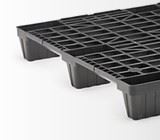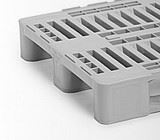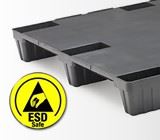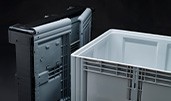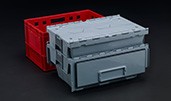The preference of this sector for the use of plastic pallets in recent years is due to its need to handle, transport and store perishable food safely and in adequate hygiene and cleanliness conditions in order to reduce waste and ensure that products reach the consumer in the right conditions.
For this reason, sectors such as meat-poultry or fishing, which are characterized by a high turnover in their products and by being in excessively humid environments, opt for plastic pallets as, in the first place, they are a hygienic material , which prevents the nesting of pests, fungi and bacteria and secondly, for being very easy to clean.
But these are not its only advantages. Do you want to know its main qualities, which models are the best or what is the best way to clean them? Do not miss the tips recommended by our Naeco, (previously Nortpalet) team!
Advantages of the plastic pallet in the food sector
Due to the hygiene and quality requirements in the food industry in general, and the particular conditions required in their work environments, plastic pallets, more specifically those belonging to the Hygienic range, have emerged as the solution that better adapted to the needs of the sector. These are some of the most important benefits for the companies that use them:
• They are certified for food use. Very suitable for the meat-poultry sector, fresh and perishable products handled in clean rooms, where the main priority is hygiene.
• The plastic complies with the phytosanitary norms and quality standards required by the HACCP directive (HACCP).
• They are waterproof and highly durable.
• They are reusable and suitable for hundreds of uses. They are therefore perfect logistics elements for the canning and transport of fruits, vegetables, and fresh products with high turnover.
• Easy to clean, dry and disinfect. These pallets are made of highly resistant and waterproof plastic materials that allow exhaustive cleaning using powerful jets of water, soaps and aggressive disinfectant products without penetrating the plastic, thus preventing them from spoiling and the accumulation of fungi, bacteria or insect pests. Cleaning on these pallets is much faster and easier.
There are also other models made of recycled plastic, suitable for the food industry, but which, due to the type of use, allows a 100% recycled and 100% recyclable material at the end of its useful life. The most frequent models are:
• The pallets of the Light range, such as the BASIC 1208-O9, frequently used in the meat, poultry, or fishing industries, among others. They are light pallets, which optimize and favor reverse logistics. Its nestability allows optimizing space and reducing the costs of empty return.
• Another sector that is implementing the plastic pallet in its circuits is the fruit and vegetable sector. The plastic pallet known as Field Pallet belonging to the Heavy range, allows to keep the load safe and always in the best conditions. These pallets support high loads and manipulations in which the pallet suffers from shocks and impacts.
In addition, these two models again guarantee hygiene and cleanliness, preventing parasites, fungi, or bacteria from nesting in them, as they can occur in other materials. And all this without the need for the pallet to be stored indoors, being able to withstand different temperatures, get wet, or be exposed to the sun, for example, without being altered.
Cleaning and maintenance of a plastic pallet
If we focus on the chapter on cleaning and maintenance, plastic pallets are very grateful, since as they are not porous, they do not require too much specialized care and they dry very quickly. In most cases, soap and water are sufficient to keep them clean. Of course, when we proceed to disinfect them in depth, we can use all kinds of products. Next, we reveal some basic tricks on how to clean plastic pallets and what products it is advisable to use.
• Pressurized water or hose. You can use specialized high-pressure machines to remove surface dirt or use a simpler hose method, which almost always turns out to be the most suitable cleaning formula.
• Ecological soap and detergents. In this way you not only keep the plastic pallets clean, but you will also be taking care of the environment.
• Washing tunnel. In some industries where the volume of pallets they handle is very high, they have specialized washing tunnels that allow this process to be carried out quickly or safely.
In any case, whenever you clean the pallets, it is recommended to take the necessary measures and precautions to do so in a safe and adequate environment. And in the case of using any chemical product, follow the manufacturer's recommendations.
Conclusion
Cleaning a plastic pallet, although it is extremely simple and does not require too much time, it is important that it be done with a certain frequency, especially if meat products or fish have been handled, transported in it or if it has been in spaces with water or high humidity.
Factors such as its high durability, resistance, reuse, and its waterproof character make the plastic pallet the perfect and essential logistics solution for the food industry.



